Swallowtails,festoons,Apollos,brushfoots
Marbled whites,graylings,ringlets,browns
Fritillaries
Whites,yellows,mimic sulphurs
Blues,coppers,hairstreaks
Blues,coppers,hairstreaks - interactive aid


| Deutsch / English | Home
and news Swallowtails,festoons,Apollos,brushfoots Marbled whites,graylings,ringlets,browns Fritillaries Whites,yellows,mimic sulphurs Blues,coppers,hairstreaks Blues,coppers,hairstreaks - interactive aid |
||||||
 |
 |
||||||
BLUES, COPPERS, HAIRSTREAKS compared
|
|||||||
| home and news - interactive aid - compared - sources - contact | |||||||
| 55 small, blue butterflies and
their differently colored conspecifics at a glance! The typical
characteristics are compared on the basis of pictures. Short outdoor
videos make identification easier. If you want to search even more
easily, try the interactive identification page "interactive
aid". The described species fly in Austria, Central Europe.
The eastern and southern parts of Austria are warmer than the
western, where you find mountains up to ~3800m (12500 feet) called
Alps. Some linked pages are in German language, but pictures and videos are self-explanatory. The colours idenitfy the groups. The link "interactive aid" leads you to an interactive identification tool (in English). |
 Send
this link by e-mail
Send
this link by e-mail |
|||||||
| Name and features | features | male Unterseite |
male Oberseite |
female Unterseite |
female Oberseite |
|||
| BLUES
(Polyommatinae) COLORLESS-Group: for blues, that have on the underside NO orange, metallic-blue spots, brush-wipe and tail. |
||||||||
| (Mountain) Alcon blue
(alcon | alcon rebeli) (video) NO orange on the underside, ocher, strong dots in a big wave (1), weak edge dots (2), basal not sprayed blue (3). Upperside male blue with a dark border; female brown, sometimes sprayed blue and dark spots on the forewing. |
 |
 |
 |
 |
 |
|||
| Green-underside blue
(alexis) (video) NO orange on the underside, light grey, forewing: dots getting bigger and closer to the edge (1), hindwing: strongly sprayed blue-green, no discaldot in the middle (2). Upperside male blue with dark border, female brown and often sprayed blue. |
 |
 |
 |
 |
 |
|||
| Holly
blue (argiolus) (video)
NO orange on the underside, forewing: line-shaped dots (1), a few edge dots (2), chequered fringes (3), hindwing: dots are small and irregularly distributed (4). Upperside male blue and only on the wingtip a dark border; female blue with a very broad dark border on the forewing. |
 |
 |
 |
 |
 |
|||
| Meleager's
blue (daphnis) (video)
NO orange on the underside, pointed hindwing (1). Male: very pale marginal dots, without brush-wipe, upperside turquoise blue with a dark border on the forewing. Female: pale marginal dots, strongly pointed hindwing (1), with brush-wipe, upperside dark and strongly sprayed blue. |

|
 |
 |
 |
 |
|||
| Iolas
blue (iolas) (video)
NO orange on the underside, forewing: dots in a rather straight line, hindwing: dots slightly wavy, pale marginal dots. Upperside male blue and on the wingtip a dark border, female brown and sprayed blue without orange. |
 |
 |
 ill. A. Spuler,
1910 ill. A. Spuler,
1910 |
 |
 |
|||
| Little
blue (minimus) (video)
NO orange on the underside, very small, forewing dots in a straight or slightly wavy line (1), hindwing second dot basal (2), 3rd-6th dot orderly (3), one dot in the middle discal (4). Upperside: brown, male often sprayed blue, female not sprayed blue. |
 |
 gender indefinite gender indefinite |
 gender indefinite gender indefinite |
 |
 |
|||
| Dusky large blue
(nausithous) (video)
NO orange on the underside, brown with brown fringes; the dots form a high wave far away from the edge (1); no edge dots (2), no dot in the middle discal (3), underside not sprayed blue. Upperside male brown and strongly sprayed blue with dark spots, female brown. |
 |
 |
 |
 |
 |
|||
| Mazarine-blue
(semiargus) (video)
NO orange on the underside, no edge dots (2), forewing: dots in a gentle wave far away from the edge (1), hindwing: second dot slightly basal (3), NO dot in the middle discal (4). Upperside male with dark border and dark veins, female brown and sometimes marginal orange dots. |
 |
 |
 |
 |
 |
|||
| Scarce
large blue (teleius) (video)
NO orange, light brown, two rows of small dots almost parallel (1). Upperside male on the forewing elongated dark spots, on the hindwing punctiform dark spots; female on the forewing and on the hindwing punctiform dark spots. |
 |
 |
 |
 |
 |
|||
| Large
blue (arion) (video)
Underside: NO orange, NO brush-wipe (1), two marginal parallel rows of dots (2), big middle-dot on the forewing (3), chequered fringes (4). Upperside with dark spots and a wide dark margin (more on the female). |
 |
 |
 |
 |
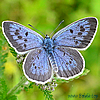 |
|||
| Alpine
blue (orbitulus) NO orange on the underside, white dots on the hindwing, no marginal dots. Upperside male blue with dark border, female brown with a blue white cellspot, often sprayed blue, wingtip lighter. |
 ill.
A. Spuler, 1910 ill.
A. Spuler, 1910 |
 gender indefinite gender indefinite ill. A. Spuler, 1910 |
 ill. A. Spuler,
1910 ill. A. Spuler,
1910 |
 gender indefinite gender indefinite ill. A. Spuler, 1910 |
 retouched ill. A. Spuler,
1910 retouched ill. A. Spuler,
1910 |
|||
| Osiris
blue (osiris) NO orange on the underside, forewing: dots in a straight or slightly wavy line, hindwing: dots disordered, one dot in the middle discal. Upperside male blue violet with a clearly dark marginal line. female dark brown sometimes sprayed blue on the forewing. |
 retouched
ill. J. Hübner, 1805 retouched
ill. J. Hübner, 1805 |
 gender indefinite gender indefinite ill. J. Hübner, 1805 |
 ill. J. Hübner,
1805 ill. J. Hübner,
1805 |
 gender indefinite gender indefinite ill. J. Hübner, 1805 |
 ill. J. Hübner,
1805 ill. J. Hübner,
1805 |
|||
| THERSITES-Group: for blues, which have orange and a brush-wipe on the underside, but no basal-dots on the forewing. | ||||||||
| Brown
argus (agestis) (video)
Fringes sometimes chequered (1), strong orange dots (2), forewing NO basal-dots (3), hindwing two dots offset downwards (4), brush-wipe (5). Upperside: brown and NOT sprayed blue, male orange dots do not reach wing tip, female orange dots reach wing tip. |
 |
 |
 |
 |
 |
|||
| Mountain
argus (artaxerxes) Fringes sometimes chequered, strong orange dots, forewing: NO basal-dots, pointed wing-tip, hindwing: two dots offset downwards, brush-wipe |
 |
 retouched ill. retouched ill. |
 retouched ill. retouched ill. |
 retouched ill. retouched ill. |
 retouched ill. retouched ill. |
|||
| Turquoise
blue (dorylas) (video)
NO basal-dot (1), noticeably white edge (2), white fringes not chequered (3), brush-wipe (4), heart-shaped orange dots (5). Upperside: male blue, female brown with orange marginal dots, rarely sprayed blue. |
 |
 |
 |
 |
 |
|||
| Escher's
blue (escheri) (video)
Not proven in Austria, strong dots, forewing: NO basal-dots, arched row of round dots, orange dots underlined in strong black, hindwing: brush-wipe, fringes on the hindwing sometimes chequered, male: white veins on the upperside. |
 |
 escheri ssp. dalmatica escheri ssp. dalmatica |
 escheri ssp. dalmatica escheri ssp. dalmatica |
 gender indefinite gender indefiniteill. A. Spuler, 1910 |
 ill. A. Spuler, 1910 ill. A. Spuler, 1910 |
|||
| Geranium
argus (eumedon) (video)
Rare; very long brush-wipe (1), NO basal-dots (2), very white fringes not chequered (3), upperside brown, lives near large-flowered Geranium. |
 |
 |
 |
 |
 |
|||
| Common
blue f. icarinus (icarus f. icarinus) Rare; fringes not chequered, forewing: NO basal-dots, hindwing: three dots on a straight line, brush-wipe. |
 |
 gender indefinite gender indefinite |
 sample picture sample picture |
 gender indefinite gender indefinite |
 sample picture sample picture |
|||
| Chapman's
blue (thersites) (video)
Brush-wipe (1), NO basal-dots (2), fringes not chequered (3), three dots on a curved line (4). |
 |
 |
 |
 |
 |
|||
| SILVER-DOT-group for blues with metallic-blue spots without tail. | ||||||||
| Silver-studded
blue (argus) (video)
Male white, female brownish fringes not chequered (1), forewing no basal-dots (2), orange dots do not reach the top (male!) (3), hindwing no brush-wipe (4), metallic-blue spots (5), no tail (6), thorns on the front and middle leg (7), Upperside male dark broad marginal border, female brown with orange girlande, sometimes sprayed blue. |

 |
 |
 |
 |
 |
|||
| Reverdin's
blue (argyrognomon) (video
♂, video ♀) White fringes not chequered (1), forewing no basal-dots (2), orange dots reach the top (3), hindwing no brush-wipe, (4), metallic-blue spots (5), no tail (6), NO thorn on the front leg (7), Upperside male blue with NOT very broad dark marginal border (8), female WHITE fringes, brown with orange dots. |
 |
 |
 |
 |
 |
|||
| Idas
blue (idas) NO thorn on the front leg, forewing: blurred orange dot at the tip of the forewing, no basal-dots, hindwing: metallic-blue spots, no brush-wipe, no tail, male: white fringes not chequered, on the upperside a small dark marginal border that forms a corner at the wing tip, female: brownish fringes not chequered. |
 |
 sample picture sample picture |
 sample picture sample picture |
 sample picture sample picture |
 sample picture sample picture |
|||
| Cranberry
blue (optilete) (video)
Near High moors, white fringes not chequered (1), forewing no basal-dots (2), hindwing metallic-blue spots, that lie over one (up to three) orange dots with a black border (3), no brush-wipe (4), no tail (5). Upperside male blue with clear dark marginal border, female brown sprayed blue and often with an orange dot. |
 |
 |
 |
 |
 |
|||
| SHORT-TAILED-Group: for True blues, with a tail on the hindwing margin and many dots on the underside. | ||||||||
| Provencal
short-tailed blue (alcetas) One or no orange marginal dot, short tail, in southern regions. Upperside male blue with clear dark marginal border and WITHOUT cellspot, female brown. |
 |
 |
 |
 |
 |
|||
| Short-tailed
blue (argiades) (video)
Two orange marginal dots, clear tail, in warm regions. Upperside male blue with clear dark marginal border and with cellspot, female brown, often sprayed blue and with orange dot(s) near the tale. |
 |
 |
 |
 |
 |
|||
| Eastern
short-tailed blue (decolorata) (video)
One or no orange marginal dot, short, white tail, in eastern regions. Upperside male blue with clear dark marginal border and with cellspot, female brown. |
 |
 |
 |
 |
 |
|||
| MIGRANT-BLUES: for True blues with a tail on the hindwing margin and brown-white stripes on the underside. | ||||||||
| Geranium
bronze (marshalli) Tail (1), underside white-brown striped, hindwing with ONE entire dark dot (2) and submarginal cone-shaped white areas (3). Upperside brown. |
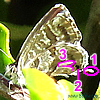 |
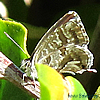 gender indefinite gender indefinite |
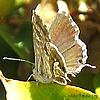 gender indefinite gender indefinite |
 gender indefinite gender indefinite |
 gender indefinite gender indefinite |
|||
| Long-tailed
blue (boeticus) Tail (1), underside white-brown striped, hindwing with ONE AND A HALF dark dots (2) with metallic-blue spots and submarginally a broad, white stripe (3). Upperside male blue to brownish, female brown and heavily sprayed blue. |
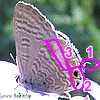 |
 gender indefinite gender indefinite |
 ill. A. Spuler, 1910 ill. A. Spuler, 1910 |
 gender indefinite gender indefiniteill. A. Spuler, 1910 |
 ill. A. Spuler, 1910 ill. A. Spuler, 1910 |
|||
| Lang's
short-tailed blue (pirithous) (video)
Tail (1), underside white-brown striped, hindwing with TWO entire dark dots (2) with metallic-blue spots and submarginal white garlands (3). Upperside of males blue or brownish, females brown and sometimes sprayed blue. |
 |
 gender indefinite gender indefinite |
 retouched ill. A. Spuler, 1910 retouched ill. A. Spuler, 1910 |
 |
 |
|||
| The remaining BLUES | ||||||||
| Amanda's
blue (amandus) (video)
Forewing no basal-dots (1), fringes not chequered (2), almost no orange and no marginal dots (3), hindwing no brush-wipe (4), pale orange dots without metallic-blue spots (5), no tail. Upperside: male with (sometimes not visible) dark, broad marginal border at the forewing, female brown with orange dots. |
 |
 |
 |
 |
 |
|||
| Baton
blue (baton) / eastern baton blue
(vicrama) (video) forewing: chequered fringes (1), no orange (2), dots in a high wave (3), with basal-dot (4), hindwing: single orange dots (5), no brush-wipe (6) . |
 |
 |
 |
 |
 |
|||
| Adonis
blue (bellargus) (video)
Fringes chequered (1), forewing basal-dot (2), hindwing brush-wipe (3) and strong orange marginal dots (4). Upperside: male blue with very narrow dark border, female brown, often sprayed blue, orange dots. |
 |
 |
 |
 |
 |
|||
| Chalk-hill
blue (coridon) (video)
Fringes chequered (1), forewing with basal-dot (2) , hindwing brush-wipe (3), reduced orange marginal dots with black marginal dots sometimes with white core (4), blue-green sprayed (5). Upperside: male blue with dark, broad marginal border, female brown, rarely sprayed blue, orange dots. |
 |
 |
 |
 |
 |
|||
| Damon
blue (damon) (video)
No orange, no marginal dots (1), forewing no basal-dot (2), hindwing VERY LONG brush-wipe (3), upperside: male blue with dark, broad marginal border, female brown sometimes sprayed blue. |
 |
 |
 |
 |
 |
|||
| Eros blue
(eros) Rare alpine blue, fringes not chequered and white, forewing: with basal-dot, hindwing: with and without brush-wipe, male with pale pattern, male upperside: dark, broad marginal border. |
 retouched ill. A. Spuler, 1910 |
 ill. A. Spuler, 1910 |
 ill. A. Spuler, 1910 |
 ill. A. Spuler, 1910 |
 retouched ill. J. Hübner, 1805 |
|||
| Glandon
blue (glandon) Underside brownish, fringes not chequered, forewing: with basal-dot, hindwing: NO brush-wipe, striking white dots, a larger orange dot in the second segment, male upperside: dark, broad marginal border. |
 retouched ill. A. Spuler, 1910 |
 gender indefinite ill. A. Spuler, 1910 |
 ill. A. Spuler, 1910 |
 gender indefinite ill. A. Spuler, 1910 |
 ill. A. Spuler, 1910 |
|||
| Common
blue (icarus) (Video
♂ | Video ♀) Fringes not chequered, forewing: with basal-dot, hindwing: three dots on a straight line, with brush-wipe. |
 |
 |
 |
 |
 |
|||
| Chequered
blue (orion) (video) Fringes chequered (1), forewing three strong rows of dots (2), with basal-dot (3), no orange, hindwing orange garland (4), NO brush-wipe. Upperside: male almost black and strongly sprayed blue, female dark brown and not so strongly sprayed blue. |
 |
 |
 |
 |
 |
|||
| COPPERS
(Lycaeninae) The forewing-underside is orange-yellow (except tityrus-male) and there is an unevan margin on the hindwing. |
||||||||
| Small
copper (phlaeas) (video)
Forewing orange with strong dots (1), marginal dotrow not up to the wing tip (2), hindwing with thin orange garland (3) and thin dots. Upperside: male and female forewing orange with a broad margin, hindwing brown with orange marginal garland. |
 |
 gender indefinite |
 gender indefinite |
 |
 |
|||
| Sooty
copper (tityrus) (video)
Forewing of the male gray or sulfur yellow, of the female orange (1), two rows of marginal dots up to the wing tip (2), hindwing mostly with single orange dots (3). Upperside: male brown with very few orange marginal dots, female forewing brown-orange, hindwing brown with orange marginal garland. |
 |
 |
 |
 |
 |
|||
| Large
copper (dispar) (video)
Forewing orange (1), marginal dots hardly up to the wing tip (2), hindwing gray with a continuous orange band (3). Upperside: male orange WITH discoidal spot, female forewing with broad dark margin and dark dots, hindwing brown-orange with orange marginal garland. |
 |
 |
 |
 |
 |
|||
| Violet copper (helle)
(video ♂) (video ♀) Forewing orange (1), WHITE underlaid sickle-shaped marginal dots up to the wing tip (2), hindwing ocher, continuous orange band (3). Upperside male and female forewing brown-orange with strong discoidal spot, hindwing brown, male shimmering violet, female hardly violet, but often with some light-violet arrows (postdiscal) before the orange marginal garland. |
 |
 |
 |
 |
 |
|||
| Purple-edged copper
(hippothoe ssp. euridice) (video
♂) (video ♀) Forewing orange (1), marginal dots mostly up to the wing tip (2), hindwing with a continuous orange band (3), postdiscal dots in a more orderly, straight line (4). Upperside: Male orange, but sprayed violet at the edges and the anal angle, female on the forewing brown-orange with postdiscal dots in a more orderly, straight line, hindwing brown with orange marginal garland. |
 |
 |
 |
 |
 |
|||
| Purple-shot copper
(alciphron) (video)
Forewing of the male gray-orange, female orange (1), two rows marginal dots, one very thin and one up to the wing tip (2), hindwing with partly continuous orange band (3), postdiscal dots in a more irregular line (4). Upperside: postdiscal dots in a more irregular line, male and female brown-orange and sometimes sprayed purple, female hindwing brown with orange marginal garland. |
 |
 |
 |
 |
 |
|||
| Scarce
copper (virgaureae) (video)
Forewing orange (1), hindwing orange with white spots (2) and small black dots. Upperside: male orange WITHOUT discoidal spot, female forewing orange, hindwing orange and sprayed dark with orange marginal garland and uneven margin. |
 |
 |
 |
 |
 |
|||
| Lesser
fiery copper (thersamon) Forewing orange (1), two rows of marginal dots up to the wing tip (2), hindwing with a mostly continuous orange band (3) and strong black marginal dots (4). Upperside: male forewing orange WITHOUT discoidal spot, hindwing sprayed dark up to the orange marginal band, female forewing orange with strong dots, hindwing brown-orange with an orange marginal garland and possibly a tail. Seems to be extinct in Austria, Central-Europe. |
 retouched ill. A. Spuler, 1910 |
 ill. A. Spuler, 1910 |
 ill. A. Spuler, 1910 |
 ill. A. Spuler, 1910 |
 ill. A. Spuler, 1910 |
|||
| HAIRSTREAKS
(Theclinae) At the hindwing underside a white dashed line crosses the wing. That line can be very pale. Otherwise there is hardly a pattern. Except for the green hairstreak (rubi), the tail is clearly visible. |
||||||||
| Sloe
hairstreak (acaciae) (video) An almost straight, continuous white line (1), orange up to the middle of the wing around a metallic dot (2), tail (3), female with black tufts of hair on the abdomen (4). |
 |
 |
 retouched ill. A. Spuler, 1910 |
 |
 retouched ill. A. Spuler, 1910 |
|||
| Brown
hairstreak (betulae) (video)
Tail, underside orange. |
 |
 |
 |
 |
 |
|||
| Ilex
hairstreak (licis) (video)
White line broken and jagged (1), orange dots extend beyond the middle of the wing (2), an angular looking orange dot (3) near the tail (4). |
 |
 |
 |
 |
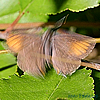 |
|||
| Black
hairstreak (pruni) (video) Tail, continuous wide garland with black dots, male forewing: translucent sex-brand. |
 |
 gender indefinite |
 retouched ill. A. Spuler, 1910 |
 |
 retouched ill. A. Spuler, 1910 |
|||
| Purple
hairstreak (quercus) (video) Tail, an orange dot. |
 |
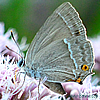 gender indefinite |
 retouched ill. A. Spuler, 1910 |
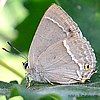 gender indefinite |
 retouched ill. A. Spuler, 1910 |
|||
| Green
hairstreak (rubi) (video)
NO Tail, underside green, white lines not always visible, lumpy edge, male forewing: translucent sex-brand. |
 |
 |
 |
 |
 |
|||
| Blue-spot
hairstreak (spini) (video)
Tail, a big metallic-blue spot, male forewing: translucent sex-brand. |
 |
 |
 retouched ill. A. Spuler, 1910 |
 |
 retouched ill. A. Spuler, 1910 |
|||
| White-letter
hairstreak (w-album) (video)
Tail, a big white "W", male forewing: translucent sex-brand. |
 |
 |
 retouched ill. A. Spuler, 1910 |
 |
 retouched ill. A. Spuler, 1910 |
|||
| Home and news - interactive aid - compared - sources - contact | ||||||||
| Appendix with designations: | ||
| {la} LYCAENIDAE Zu den Bläulingen zählen die (wissenschaftlich ungeklärten) Unterfamilien Echte Bläulinge (Polyommatinae), Feuerfalter (Lycaeninae) und Zipfelfalter (Theclinae). |
{de} BLÄULINGE, FEUERFALTER, ZIPFELFALTER | {en} BLUES, COPPERS, HAIRSTREAKS |
| {la} Satyrium acaciae (Fabricius, 1787),Papilio/ Thecla/ Nordmannia/ Fixenia acaciae, Satyrium nostra (Courvoisier, 1913). | {de} Kleiner Schlehen-Zipfelfalter, Akazien-Zipfelfalter, Krüppelschlehen-Zipfelfalter, Zwergschlehen-Zipfelfalter | {en} Sloe
hairstreak {es} Sin Perfume {fr} Thècle de l'amarel, Thècle de l'acacia {it} Satirio dell'acacia {sk} Mali repkar {sv} Slånsnabbvinge |
| {la} Aricia agestis (Denis und
Schiffermüller, 1775) Weitere Namen (W. F. Kirby ,1871): Cupido Alexis (Scopoli, 1763), Papilio Medon (Hufnagel, 1766), Papilio Agestis (Wiener Verzeichniss, 1776), Papilio Astrache (Bergsträsser, 1779), Papilio Idas (Lewiu, 1795). |
{de} Kleiner Sonnenröschen-Bläuling, Dunkelbrauner Bläuling, Zweibrütiger Sonnenröschen-Bläuling, Heidenwiesen-Bräunling | {en} Brown
argus {es} Morena serrana {fr} Collier-de-corail, Argus brun {it} Aricia dei campi {sk} Navadna rjavka {sv} Rödfleckig blåvinge |
| {la} Cupido alcetas (Hoffmannsegg, 1804), Everes alcetas | {de}Südlicher Kurzschwänziger Bläuling | {en} Provencal
short-tailed blue {es} Rabicorta {fr} Azuré de la faucille, Azuré frêle, Argus rase-queue {it} Alceta {sk} Modri kratkorepec {sv} Sydlig kortsvansad blåvinge |
| {la} Lycaena alciphron (Rottemburg,
1775), Chrysophanus/ Heodes/ Thersamolycaena alciphron, Lycaena
melibaeus (Staudinger, 1878), L. gordius (Sulzer, 1776). Weitere Namen (W. F. Kirby ,1871): Papilio Alciphron (Rottemburg, 1775), Papilio Virgaureae (Hufnagel, 1766), Papilio Lampetie (Wien. Verz., 1776; Hübner, 1798-1803), Papilio Hipponoe (Esper, 1782) Polyommatus Hipponoe (Herrich-Schäffer, 1847), Papilio Helle (Borkhausen, 1788), Papilio Hiere (Fabricius, 1787), Polyommatus Hiere (Godart, 1823) |
{de} Violetter Feuerfalter, Violettsilberfalter, Violettsilber-Feuerfalter | {en} Purple-shot
copper {es} Manto de púrpura {fr} Cuivré mauvin, Cuivré flamboyant, Argus pourpre, Grand Argus Bronzé {it} Alcifrone {sk} Sprminjavi cekinček {sv} Stor violett guldvinge |
| {la} Phengaris alcon (Denis und
Schiffermüller, 1775), Maculinea alcon (Denis und Schiffermüller,
1775) Weitere Namen (W. F. Kirby ,1871): Cupido Alcon (Wiener Verzeichniss, 1776), Papilio Arcas (Esper, 1778?), Papilio Telejus, Mamers (Bergsträsser, 1779) |
{de} Enzian-Ameisenbläuling, Lungenenzian-Ameisenbläuling, Kleiner Moorbläuling | {en} Alcon
blue, Alcon large blue {es} Hormiguera {fr} Azuré des mouillères, Protée {it} Maculinea di montagna {sk} Sviščar mravljiščar {sv} Alconblåvinge |
| {la} Phengaris alcon f. rebeli, Phengaris rebeli, Glaucopsyche rebeli, Maculinea rebeli (Hirschke,1904). | {de} Enzian-Ameisenbläuling, Kreuzenzian-Ameisenbläuling, Enzianbläuling | {en} Mountain
Alcon blue {es} Phengaris rebeli {fr} Azuré de la croisette, Argus bleu marine {it} Maculinea di Rebel {sk} Rebelov mravljiščar |
| {la} Glaucopsyche alexis (Poda, 1761),
damoetas (Schiffermüller, 1776) Weitere Namen (W. F. Kirby ,1871): Cupido Cyllarus (Rottenburg, 1775), Papilio Alexis (Poda, 1761), Papilio Damoetas (Wiener Verzeichniss, 1776), Papilio Dymus (Herbst, 1804). |
{de} Himmelblauer Steinklee-Bläuling, Alexis-Bläuling, Großpunkt-Bläuling, Steinklee-Bläuling, Buchsteppenheiden-Bläuling | {en} Green-underside
blue {es} Manchas verdes {fr} Azuré des cytises {it} Alexis {sk} Grahovčev iskrivček {sv} Klöverblåvinge |
| {la} Polyommatus amandus (Schneider
1792), Agrodiaetus amanda Weitere Namen (W. F. Kerby ,1871): Cupido Icarius (Esper, 1790), Papilio Amandus (Schneider, 1792). |
{de} Vogelwicken-Bläuling, Prächtiger Bläuling | {en} Amanda's
blue {es} Niña estriada {fr} Azuré de la jarosse, Argus ligné {it} Amanda {sk} Ljubki modrin {sv} Silverfärgad blåvinge |
| {la} Cupido argiades (Pallas, 1771),
Everes argiades, tiresias, Papilio amyntas (Denis &
Schiffermüller, 1775) Weitere Namen (W. F. Kirby ,1871): Cupido Argiades (Pallas, 1771), Papilio Amyntas (Fabricius, 1775), ? Papilio Glandon (De Prunner, 1798), Papilio Tiresias (Rottenburg, 1775), Cupido Puer (Schrank, 1801), Papilio Alcetas (Hübner, 1805), ? Papilio Zachoeus (Herbst, 1804) |
{de} Kurzschwänziger Bläuling | {en} Short-tailed
blue, tailed Cupid {es} Naranjitas rabicorta {fr} Azuré du trèfle, Argus mini-queue {it} Argiade {sk} Rumenooki kratkorepec {sv} Kortsvansad blåvinge |
| {la} Celastrina argiolus (Linnaeus,
1758) Weitere Namen (W. F. Kirby ,1871): Cupido Argiolus (Linnaeus, 1761), Papilio Cleobis (Sulzer, 1776), Papilio Argiolus, Thersamon, Argyrophontes, Argalus (Bergsträsser, 1779), Papilio Argus marginatus (Retzius, 1783), Papilio Acis (Fabricius, 1787). |
{de} Faulbaum-Bläuling, Buschheideland-Bläuling | {en} Holly
blue {es} Náyade {fr} Azuré des nerpruns, Argus à bande noire {it} Celestrina {sk} Svetli krhlikar {sv} Tosteblåvinge |
| {la} Plebejus argus (Linnaeus, 1758),
aegon (Denis und Schiffermüller, 1775) Weitere Namen (W. F. Kirby ,1871): Cupido Argus (Linnaeus, 1761), Papilio Aegon (Wiener Verzeichniss, 1776), Papilio Alsus (Esper, 1790?), Papilio Philonomus, Argyrotoxus, Argyra, Argyrophalara (Bergsträsser, 1779), Papilio Idas (nur Weibchen, Linnaeus, 1761). |
{de} Argus-Bläuling, Geißkleebläuling, Kleiner Silberfleckbläuling, Tiefblauer Silberfleckbläuling | {en} Silver-studded
blue {es} Niña, Niña hocecillas {fr} Azuré de l'ajonc, Petit argus, Argus bleu {it} Argo {sk} Širokorobi mnogook {sv} Allmän blåvinge |
| {la} Plebejus argyrognomon
(Bergsträsser, 1779), ismenias (Meigen, 1829), aegus (Chapman, 1917) Weitere Namen (W. F. Kirby ,1871): Cupido Argyrognomon (Bergsträsser, 1779), Papilio Argyrocapelus, Argyroela, Argyrocopus, Argyrophylax, Argyrobius (Bergsträsser, 1779), Papilio Argus (Wiener Verzeichniss., 1776), Hesp. Amphion (Fabricius, 1793), Argus Vulgaris (Lamarck, 1835). |
{de} Kronwicken-Bläuling, Kronwicken-Silberfleck-Bläuling | {en} Reverdin's
blue {es} Plebejus argyrognomon {fr} Azuré des coronilles, Azuré porte-arceaux, Argus fléché {it} Falso Idas {sk} Srebrni mnogook {sv} Kronärtblåvinge |
| {la} Phengaris arion (Linnaeus, 1758),
Maculinea arion (Linnaeus, 1758). Weitere Namen (W. F. Kirby ,1871): Cupido Arion (Linnaeus, 1761), Papilio Telejus, Telegonus (Bergsträsser, 1779). |
{de} Thymian-Ameisenbläuling, Schwarzfleckiger Ameisenbläuling, Thymianheiden-Bläuling, Quendel-Ameisenbläuling, Arion-Bläuling | {en} Large
blue {es} Hormiguera de lunares {fr} Azuré du Serpolet, Argus Arion, Azuré d'Arion, Argus à bandes brunes {it} Maculinea del timo {sk} Veliki mravljiščar {sv} Svartfläckig blåvinge |
| {la} Aricia artaxerxes
(Fabricius, 1793), allous (Geyer, 1837) Weitere Namen (W. F. Kirby ,1871): Cupido Artaxerxes (Fabricius, 1793) |
{de} Großer Sonnenröschen-Bläuling, Einbrütiger Sonnenröschen-Bläuling | {en} Mountain
argus, northern brown argus, Scotch argus {es} Aricia artaxerxes {fr} Argus de l'Hélianthème, Argus marron {it} Aricia di montagna {sk} Hribiska rjavka {sv} Förväxlad blåvinge |
| {la} Pseudophilotes baton (Bergsträsser,
1779), Scolitantides baton (Bergsträsser, 1779) Weitere Namen (W. F. Kirby ,1871): Cupido Hylas (Wiener Verzeichniss, 1776), Papilio Hqlactor, Baton (Bergsträsser, 1779), Papilio Amphion (Esper, 1780). |
{de} Westlicher Quendel-Bläuling, Graublauer Bläuling | {en} Baton
blue {es} Falso abencerraje {fr} Azuré de la sarriette, Azuré du thym {it} Batone {sv} Batonblåvinge |
| {la} Lysandra bellargus (Rottenburg,
1775); Polyommatus adonis (Denis und Schiffermüller, 1775),
Variation: Polyommata bellarga f. ceronus (Esper, 1784). Weitere Namen (W. F. Kirby ,1871): Cupido Thetis (Rottenburg, 1775), Papilio Bellargus (Rottenburg, 1780), Papilio Adonis (Wiener Verzeichniss, 1776), Papilio Salacia, Venilia, Oceanus, Bellargus (Bergsträsser, 1779), Papilio Hyacinthus (Lewiu, 1795), Papilio Argus (nur Weibchen, Donovan?, 1795). {la} Lysandra bellargus (Rottenburg, 1775) punctifera. |
{de} Himmelblauer Bläuling | {en} Adonis
blue {es} Niña celeste {fr} Belargus, Bel-Argus, Azuré bleu céleste, Adonis bleu, Argus bleu ciel {it} Bellargo {sk} Sinji modrin {sv} Adonisblåvinge |
| {la} Thecla betulae (Linnaeus, 1758),
Thecla spinosae (Gerhard, 1853) Weitere Namen (W. F. Kirby ,1871): Zephyrus betulae (Linnaeus, 1758), Papilio betulae (Linnaeus, 1758); Weitere Namen werden angeführt bei Wikispecies (Stand 21.12.2017). |
{de} Nierenfleck-Zipfelfalter, Nierenfleck, Birken-Zipfelfalter, Spätsommer-Zipfelfalter | {en} Brown
hairstreak {es} Topacio {fr} Thècle du bouleau {it} Tecla della betulla {sk} Lepi brezar {sv} Björksnabbvinge |
| {la} Lampides boeticus (Linnaeus, 1767) Weitere Namen (W. F. Kirby ,1871): Cupido Baeticus (Linnaeus, 1767), Papilio Coluteae (Fuessly, 1775), Papilio Pisorum (Fourcroy, 1785). |
{de} Großer Wanderbläuling, Geschwänzter Blasenstrauch-Bläuling | {en} Long-tailed
blue, pea-pod argus, pea blue {es} Canela estriada {fr} Azuré porte-queue {it} Lampide di Spagna {sk} Repati lesketavček {sv} Långsvansad blåvinge |
| {la} Lysandra coridon ( Poda, 1761),
Polyommatus, Meleageria, Lycaena cordion Weitere Namen (W. F. Kirby ,1871): Cupido Corydon (Scopoli, 1763), Papilio Pramafana (De Prunner, 1798), Papiliio Corydon (Hübner, 1803-1818), Lycaena Olympica (Lederer, 1852). |
{de} Silbergrüner Bläuling, Grastrift-Bläuling, Schafschwingelrasen-Bläuling, Coridon-Bläuling, Silber-Bläuling, Silberblauer Bläuling | {en} Chalk-hill
blue {es} Niña coridon {fr} Argus bleu-nacré {it} Coridon {sk} Kraški modrin {sv} Ljus blåvinge |
| {la} Polyommatus damon (Denis und
Schiffermüller, 1775), Agrodiaetus damon. Weitere Namen (W. F. Kirby ,1871): Cupido Damon (Wiener Verzeichniss, 1776), Papilio Biton (Sulzer, 1776) |
{de} Großer Esparsetten-Bläuling, Streifen-Bläuling, Weißdolch-Bläuling, Grünblauer Bläuling | {en} Damon
blue {es} Azul Cintada {fr} Sablé du sainfoin {it} Milleocchi di Damone {sv} Damonblåvinge |
| {la} Polyommatus daphnis (Denis & Schiffermüller, 1775), Papilio daphnis (Schiffermüller, 1775), Meleageria daphnis (Denis & Schiffermüller, 1775), Papilio endymion (Schiffermüller, 1775), Papilio meleager (Esper, 1779) | {de} Zahnflügel-Bläuling, Meleager | {en} Meleager's
blue {es} Azul bipuntada {fr} Azuré de l'orobe, Azuré festonné, Argus bleu pâle, Argus bleu découpé, Daphnis, Argus céleste, Méléagre {it} Dafne azzurra {sk} Nazobčani modrin {sv} Meleagers blåvinge |
| {la} Cupido decolorata (Staudinger,
1886), Everes sebrus (Hübner ,1824) Weitere Namen (W. F. Kirby ,1871): Cupido Sebrus (Hübner, 1818-1827), Polyommatus Nicias (Meigen, 1830), Polyommatus Saportoe (Duponchel, 1832). |
{de} Östlicher Kurzschwänziger Bläuling | {en} Eastern
short-tailed blue {es} Cupido decoloratus {fr} Azuré de la minette, Azuré de Staudinger {sk} Brezoki kratkorepec {sv} Östlig kortssvansad blåvinge |
| {la} Lycaena dispar (Haworth, 1803),
Chrysophanus/ Thersamolycaena dispar (Haworth, 1803) Weitere Namen (W. F. Kirby ,1871): Papilio Dispar (Haworth, 1803), Papilio Hippothoe (Esper, 1778) |
{de} Großer Feuerfalter, Großer Ampferfeuerfalter, Großer Dukatenfalter | {en} Large
copper {es} Lycaena dispar {fr} Grand cuivré, Cuivré des marais {it} Licena della paludi {sk} Močvriski cekinček {sv} Stor guldvinge |
| {la} Polyommatus dorylas (Denis und
Schiffermüller, 1775); Plebicula argester. Weitere Namen (W. F. Kirby ,1871): Cupido Dorylas (Wiener Verzeichniss, 1776), Papilio Hylas (Esper, 1779), Papilio argester (Bergsträsser, 1779), Papilio Daedalus (Giorna, 1791-1793), Lycaena dorylas, var. (Rambur, 1858). |
{de} Wundklee-Bläuling, Großer Wundklee-Bläuling, Hellrandiger Bläuling, Steinklee-Bläuling, Hylas-Bläuling | {en} Turquoise
blue {es} Niña turquesa {fr} Azuré du mélilot, Argus turquoise {it} Dorila {sk} Turkizni modrin {sv} Honungsklöverblåvinge |
| {la} Polyommatus eros (Ochsenheimer,
1808). Weitere Namen (W. F. Kirby ,1871): Cupido Tithonus (Hübner, 1798-1803), Papilio Eros (Ochsenheimer, 1808). |
{de} Eros-Bläuling | {en} Eros
blue {es} Niño amoroso {fr} Azuré de l'oxytropide, Azuré d'Eros {it} Eros {sv} Eros blåvinge |
| {la} Polyommatus escheri (Hübner,
1823), Agrodiaetus escheri, Polyommatus dalmatica (Speyer, 1882),
olympena (Verity, 1936), splendens (Stefanelli, 1904) Weitere Namen (W. F. Kirby ,1871): Cupido Agestor (Godat, 1823), Papilio Escheri (Hübner, 1818-1827). |
{de} Escher-Bläuling | {en} Escher's
blue {es} Fabiola {fr} Azuré du plantain {it} Milleocci di Escher {sk} Primorski modrin {sv} Eschers blåvinge |
| {la} Eumedonia eumedon (Esper, 1780);
Plebejus eumedon, Aricia eumedon. Weitere Namen (W. F. Kirby ,1871): Cupido Chiron (Rottenburg, 1775), Papilio Eumedon (Esper, 1780), ?Papilio Bellinus (De Prunner, 1798), Papilio Cleon (Schneider, 1787). |
{de} Storchschnabel-Bläuling, Schwarzbrauner Bläuling | {en} Geranium
argus {es} Raya corta {fr} Azuré de la sanguinaire {it} Eumedone {sk} Krvomočničina rjavka {sv} Brun blåvinge |
| {la} Plebejus glandon (Prunner, 1798),
Agriades glandon. Weitere Namen (W. F. Kirby ,1871): Cupido Orbitulus (Esper, 1800 ?), Papilio Meleager (Hübner, 1798-1803), Lycaena Franklinii (Curtis, 1835). |
{de} Dunkler Alpen-Bläuling | {en} Glandon
blue {es} Poco brillo {fr} Azuré des soldanelles, Argus gris-bleu {it} Argiade del delfinato {sv} Glandonblåvinge |
| {la} Lycaena helle (Denis &
Schiffermüller, 1775), Papilio amphidamas (Esper, 1781). Weitere Namen (W. F. Kirby ,1871): Papilio Xanthe (Lang., 1789). |
{de} Blauschillernder Feuerfalter | {en} Violet
copper {es} Manto violeta {fr} Cuivré de la bistorte {it} Licena della bistorta {sv} Violett guldvinge |
| {la} Lycaena hippothoe (Linnaeus,
1761), Chrysophanus/ Palaeochrysophanus/ Papilio hippothoe
(Linnaeus, 1761), Papilio eurybia (Ochsenheimer, 1808). Weitere Namen (W. F. Kirby ,1871): Papilio Euridice (Rottemburg, 1775, Esper 1778, Hübner, 1798-1803), Papiliio Chryseis (Wien. Verz., 1776; Hübner, 1798-1803), Polyommatus Chryseis (Godart, 1823), Papilio Xenophon (De Loche, 1801). |
{de} Lilagold-Feuerfalter, Lilagoldfalter, Kleiner Ampferfeuerfalter | {en} Purple-edged
copper {es} Manto de Cobre {fr} Cuivré écarlate, Argus satiné changeant {it} Ippotoe {sk} Škrlatni cekinček {sv} Violettkantad guldvinge |
| {la} Polyommatus icarus (Rottenburg,
1775). Weitere Namen (W. F. Kirby ,1871): Cupido Icarus (Rottenburg, 1775), Papilio Thetis (nur Weibchen, Esper, 1778 ?), Papilio Alexis, var.2 (Scopoli, 1763), Papilio Pampholyge, Candybus, Caniope, Candaon (Bergsträsser, 1779), Papilio Polyphemus (Esper, 1780), Papilio Argus (Berkenhout, 1795), Papilio Fusciolus (nur Weibchen, Fourcroy, 1785), Papilio Icarus (Esper, 1780), Lycaena Alexis (Herrich-Schäffer, 1844), Lycaena Alexius (Freyer, 1858 ?), Lycaena Al. var. Thersites (Gerhard, 1853). |
{de} Hauhechel-Bläuling, Gemeiner Bläuling, Ikarus-Bläuling | {en} Common
blue {es} Dos puntos {fr} Argus bleu, Azuré commun, Azuré de la Bugrane {it} Icaro {sk} Navadni modrin {sv} Punktörneblåvinge |
| {la} Plebejus idas (Linnaeus, 1761) Weitere Namen (W. F. Kirby ,1871): Cupido Argyrognomon (Bergsträsser, 1779), Papilio Argyrocapelus, Argyroela, Argyrocopus, Argyrophylax, Argyrobius (Bergsträsser, 1779), Papilio Argus (Wiener Verzeichniss., 1776), Hesp. Amphion (Fabricius, 1793), Argus Vulgaris (Lamarck, 1835). |
{de} Ginster-Bläuling, Ginster-Silberfleckbläuling, Heidewiesen-Bläuling | {en} Idas
blue {es} Niña esmaltada {fr} Azuré du genêt, Idas, Argus sagitté, Moyen argus, Bleu nordique, Argus bleu-violet {it} Idas {sk} Ozkorobi mnogook {sv} Föränderlig blåvinge |
| {la} Satyrium ilicis (Esper, 1779),
Thecla ilicis (Esper, 1779), Nordmannia ilicis (Esper, 1779),
Papiliio ilicis (Esper, 1779), Zhecla caudatula (Zeller,1847),
Satyrium cilicica (Holtz, 1897), Thecla prinoptas (Zerny, 1932),
Thecla syra (Pfeiffer, 1932), Fixenia ilicis Weitere Namen (W. F. Kirby ,1871): Papilio Lynceus (Fabricius, 1787), Polyommatus Lynceus (Godart, 1823), Papilio Cerasi (Herbst, 1804), Thecla Bischoffii (Gerhard, 1853), Papilio Esculi (Hübner, 1818-1827). Weitere Synonyme werden angeführt bei Wikispecies (Stand 21.12.2017). |
{de} Brauner Eichen-Zipfelfalter, Eichen-Zipfelfalter, Steineichenfalter, Steineichenzipfelfalter | {en} Ilex
hairstreak {es} Querquera serrana {fr} Thècla de l'yeuse {it} Satirio del leccio {sk} Hrastov repkar {sv} Järneksnabbvinge |
| {la} Iolana iolas (Ochsenheimer, 1816)
Weitere Namen (W. F. Kirby ,1871): Cupido Iolas (Ochsenheimer, 1816), Papilio Iolaus (Hübner, 1818-1827) |
{de} Blasenstrauch-Bläuling, Großer Blasenstrauch-Bläuling | {en} Iolas
blue {es} Espantalobos {fr} Azuré du baguenaudier, Argus du Baguenaudier, Argus géant {it} Iolana {sk} Veliki mehurkar {sv} Iolasblåvinge |
| {la} Cacyreus marshalli (Butler, 1897). | {de} Pelargonien-Bläuling, Pelargonien-Wander-Bläuling | {en} Geranium
bronze {es} Mariposa del geranio, polilla del geranio, mariposa africana {fr} Brun des pélargoniums {it} Argo del Geranio, Licenide dei gerani, Minatore dei Gerani {sk} Pelargonijev bakerenček {sv} Trädgårdsblåvinge |
| {la} Cupido minimus (Fuessli, 1775),
alsus (Denis und Schiffermüller, 1775). Weitere Namen (W. F. Kirby ,1871): Cupido Alsus (Wiener Verzeichniss, 1776), Papilio Pseudolus (Bergsträsser, 1779), Cupido Puer (Schrank, 1801), Papilio Minimus (Esper, 1778?), ? Papilio Minutus (Esper, 1800?). |
{de} Zwerg-Bläuling, Winziger Bläuling, Kleiner Wundklee-Bläuling | {en} Little
blue, Small blue {es} Deunde oscuro {fr} Argus frêle, Argus minime {it} Cupido minore {sk} Mali kupido {sv} Liten blåvinge |
| {la} Phengaris nausithous (Bergsträsser,
1779), Maculinea nausithous (Bergsträsser, 1779), Glaucopsyche
nausithous. Weitere Namen (W. F. Kirby ,1871): Cupido Arcas (Rottenburg, 1775), Papilio Nausithous (Bergsträsser, 1779), Papilio Erebus (Knoch, 1782). |
{de} Dunkler Wiesenknopf-Ameisenbläuling, Dunkler Moorbläuling, Schwarzblauer Bläuling, Schwarzblauer Moorbläuling, Schwarzblauer Wiesenknopf-Ameisenbläuling | {en} Dusky
large blue {es} Hormiguera oscura {fr} Azuré des paluds {sk} Temni mravljiščar {sv} Mörk blodtoppblåvinge |
| {la} Plebejus optilete (Knoch, 1781),
Vacciniina, Papilio, Agriades optilete (Knoch, 1781). Weitere Namen (W. F. Kirby ,1871): Cupido Optilete (Knoch, 1781), Papilio Nanus (Herbst, 1804). |
{de} Hochmoor-Bläuling, Moorheiden-Bläuling, Moor-Heidelbeeren-Bläuling, Violetter Silberfleck-Bläuling | {en} Cranberry
blue, Yukon blue {es} Plebejus optilete {fr} Azuré de la canneberge, Argus pervenche {it} Albulina del mirtillo {sk} Borovničeva mnogook {sv} Violett blåvinge |
| {la} Plebejus orbitulus (De Prunner,
1798), Albulina orbitulus, Agriades orbitulus (De Prunner, 1798). Weitere Namen (W. F. Kirby ,1871): Cupido Atys (Hübner, 1798-1803), Papilio Pheretes (Hübner, 1805), Papilio Orbitulus (Prunner, 1798). |
{de} Heller Alpen-Bläuling | {en} Alpine
blue, Alpine argus {es} Plebejus orbitulus {fr} Plebejus orbitulus, Azuré de la phaque {it} Albulina dell' astralago {sk} Gorska bledica {sv} Fjällvickerblåvinge |
| {la} Scolitantides orion (Pallas,
1771). Weitere Namen (W. F. Kirby ,1871): Cupido Battus (Wiener Verzeichniss, 1776), Papilio Telephii (Esper, 1779?), Papilio Argus (Scopoli, 1763), Papilio Hecateus (Drapier, 1819), Papilio Sedi (Fabricius, 1781). |
{de} Fetthennen-Bläuling, Felssteppen-Bläuling | {en} Chequered
blue {es} Banda anaranjada {fr} Azuré des orpins {it} Orione {sk} Homuljičin krivček {sv} Fetörtsblåvinge |
| {la} Cupido osiris (Meigen, 1829), sebrus (Boisduval, 1832) | {de} Kleiner Alpen-Bläuling | {en} Osiris
blue {es} Duende mayor {fr} Azuré de la chevrette, Azuré osiris {it} Osiride {sk} Modri kupido {sv} Osirisblåvinge |
| {la} Lycaena phlaeas (Linnaeus 1761),
Chrysophanus/Papilio/Polyommatus phlaeas (Linnaeus 1761), Papilio
timeus (Cramer, 1777). Weitere Namen (W. F. Kirby ,1871): Papilio Virgaureae, w. (Scopoli, 1763) |
{de} Kleiner Feuerfalter | {en} Small
copper, Common copper, American copper {es} mariposa manto bicolor {fr} Cuivré commun, Bronzé {it} Fleade, Argo bronzeo {sk} Mali cekinček {sv} Liten guldvinge |
| {la} Leptotes pirithous (Linnaeus,
1767), Syntarucus pirithous, telicanus (Lang, 1789).
Weitere Namen (W. F. Kirby ,1871): Cupido Telicanus (Hübner, 1798-1803), Papilio Boeticus (Esper, 1784). |
{de} Kleiner Wanderbläuling, Langschwänziger Bläuling | {en} Lang's
short-tailed blue, Common Zebra blue {es} Gris Estriada {fr} Azuré de la luzerne, Azuré de Lang {it} Piritoo {sk} Modri marogarček {sv} Liten långsvansad blåvinge |
| {la} Satyrium pruni (Linnaeus, 1758),
Papilio/ Thecla/ Nordmannia/ Strymonidia/ Fixsenia pruni (Linnaeus,
1758) Weitere Namen (W. F. Kirby ,1871): Papilio Prorsa (Hufnagel, 1766) |
{de} Pflaumen-Zipfelfalter | {en} Black
hairstreak {es} Endrinera {fr} Thècle du prunier, Thècle du coudrier {it} Satirio del prugnolo {sk} Slivov repkar {sv} Plommonsnabbvinge |
| {la} Favonius quercus (Linnaeus,
1758), Quercusia/ Papilio/ Polyommatus/ Thecla/ Zephyrus/
Neozephyrus quercus (Linnaeus, 1758) Weitere Namen (W. F. Kirby ,1871): Papilio Epeus (Sulzer, 1776) |
{de} Blauer Eichen-Zipfelfalter | {en} Purple
hairstreak {es} Nazarena {fr} Thècle du chêne {it} Tecla della quercia {sk} Modri hrastar {sv} Eksnabbvinge |
| {la} Callophrys rubi (Linnaeus, 1758),
Papilio/Thecla/Polyommatus rubi, Papilio suaveola (Staudinger,
1881), Papilio caecus (Geoffroy, 1785) Weitere Namen (W. F. Kirby ,1871): Papilio Cœcus (Fourcroy, 1785). |
{de} Grüner Zipfelfalter, Brombeerzipfelfalter | {en} Green
hairstreak {es} Cejialba {fr} Thècle de la ronce, Argus vert {sk} Zeleni robidar {sv} Björnbärssnabbvinge |
| {la} Cyaniris semiargus (Rottenburg,
1775), acis (Denis und Schiffermüller, 1775) Weitere Namen (W. F. Kirby ,1871): Cupido Semiargus (Rottenburg, 1775), Papilio Acis (Wiener Verzeichniss, 1776), Papilio Argiolus (Esper, 1778), Papilio Cimon (Lewiu, 1795), Papilio Bizas, Bize, Argopoeus, Bizenus, Bizene, Damoetas, Argopoei (Bergsträsser, 1779), ? Papilio Frejus (De Prunner, 1798). |
{de} Rotklee-Bläuling, Violetter Waldbläuling, Kleinpunktbläuling | {en} Mazarine
blue {es} Falsa limbada {fr} Azuré des anthyllides, Demi-argus, Argus violet {it} Semiargo {sk} Modri grašičar {sv} Ängsblåvinge |
| {la} Satyrium spini (Denis und
Schiffermüller. 1775), Papilio/ Thecla/ Polyommatus /Nordmannia/
Strymonidia spini. Weitere Namen (W. F. Kirby ,1871): Papilio Lynceus (Esper, 1779?, Hübner, 1803-1818) |
{de} Kreuzdorn-Zipfelfalter, Schlehen-Zipfelfalter | {en} Blue-spot
hairstreak {es} Mancha azul {fr} Thècle des nerpruns, Thècle de l'aubépine, Thécla du prunellier {it} Satirio dello spincervino {sv} Blåfläckad snabbvinge |
| {la} Phengaris teleius (Bergsträsser,
1779), Maculinea teleius, Glaucopsyche
teleius, Papilio telegonus (Bergsträsser, 1779). Weitere Namen (W. F. Kirby ,1871): Cupido Diomedes (Rottenburg, 1776), Papilio Arctophylax, Arctophonus (Bergsträsser, 1779), Papilio Argiades (Fabricius, 1787), Papilio Euphemus (Hübner, 1798-1803) |
{de} Heller Wiesenknopf-Ameisenbläuling, Großer Moorbläuling | {en} Scarce
large blue {es} Limbada {fr} Azuré de la sanguisorbe, Argus strié, Télégone {it} Maculinea della sanguisorba {sk} Strašničin mravljiščar {sv} Blodtoppblåvinge |
| {la} Lycaena thersamon (Esper, 1784),
Papilio/ Polyommatus/Thersamonia thersamon. Weitere Namen (W. F. Kirby ,1871): Papilio Xanthe (Hübner, 1798-1803) |
{de} Südöstlicher Feuerfalter | {en} Lesser
fiery copper {es} Lycaena thersamon {fr} Cuivré du genêt {it} Tersamone {sv} Blek guldvinge |
| {la} Polyommatus thersites (Cantener, 1835), Agrodiaetus thersites | {de} Esparsetten-Bläuling, Kleiner Esparsetten-Bläuling | {en} Chapman's
blue {es} Celda limpia {fr} Azuré de l'esparcette, Azuré de Chapman, Argus bleu roi {sk} Deteljin modrin {sv} Esparsettblåvinge |
| {la} Lycaena tityrus (Poda, 1761), Heodes tityrus (Poda, 1761), Lycaena/ Chrysophanus dorilis (Hufnagel, 1766), Lycaena acrion (Pontoppidan, 1763), Lycaena dorilas (Rottemburg, 1775), Papilio circe (Schiffermüller, 1775), Papiliio xanthe (Schiffermüller, 1775), Papilio Phocas (Rottemburg, 1775), Lycaena hypoxanthe (Kirby, 1862), Palaeoloweia opisthochros (Verity, 1939), Lycaena arentifex (Bálint, 1990). | {de} Brauner Feuerfalter, Schwefelvögelchen, Dunkler Feuerfalter | {en} Sooty
copper {es} Manto oscuro {fr} Cuivré fuligineux, Argus myope, Polyommate Xanthé {it} Titiro {sk} Temni cekinček {sv} Dansk guldvinge |
| {la} Pseudophilotes vicrama (Moore,
1865), oder Pseudophilotes schiffermuelleri (Hemming, 1929) oder
Pseudophilotes vicrama ssp. schiffermuelleri |
{de} Östlicher Quendelbläuling | {en} Eastern
baton blue {es} Pseudophilotes vicrama schiffermuelleri {fr} Azuré de Schiffermüller {it} Batone orientale {sk} Šetrajev sleparček |
| {la} Lycaena virgaureae (Linnaeus, 1758), Papilio/Polyommatus/Chrysophanus/Heodes virgaureae | {de} Dukatenfalter, Großer Feuerfalter, Dukaten-Feuerfalter, Gemeiner Dukatenfalter | {en} Scarce
copper {es} Manto de oro {fr} Cuivré de la verge-d'or, Cuivré satiné, Argus satiné, Verge-d'or, Polyomate de la Verge-d'or {it} Licena della Verge d'oro {sk} Zlati cekinček {sv} Vitfläckig guldvinge |
| {la} Satyrium w-album (Knoch,
1782),Papilio/ Thecla/ Polyommatus/ Fixenia/ Strymonidia/ Nordmannia
w-album. Weitere Namen (W. F. Kirby ,1871): Papilio Cerasi (Fabricius, 1787), Papilio W-latinum (Lang, 1789), Papilio Pruni (Lewiu, 1795) |
{de} Ulmen-Zipfelfalter, Weißes W | {en} White-letter
hairstreak {es} W-blanca {fr} Thècle de l'orme, W-blanc {it} Satirio W bianca {sk} Beločrti repkar {sv} Almsnabbvinge |
| contact | ||